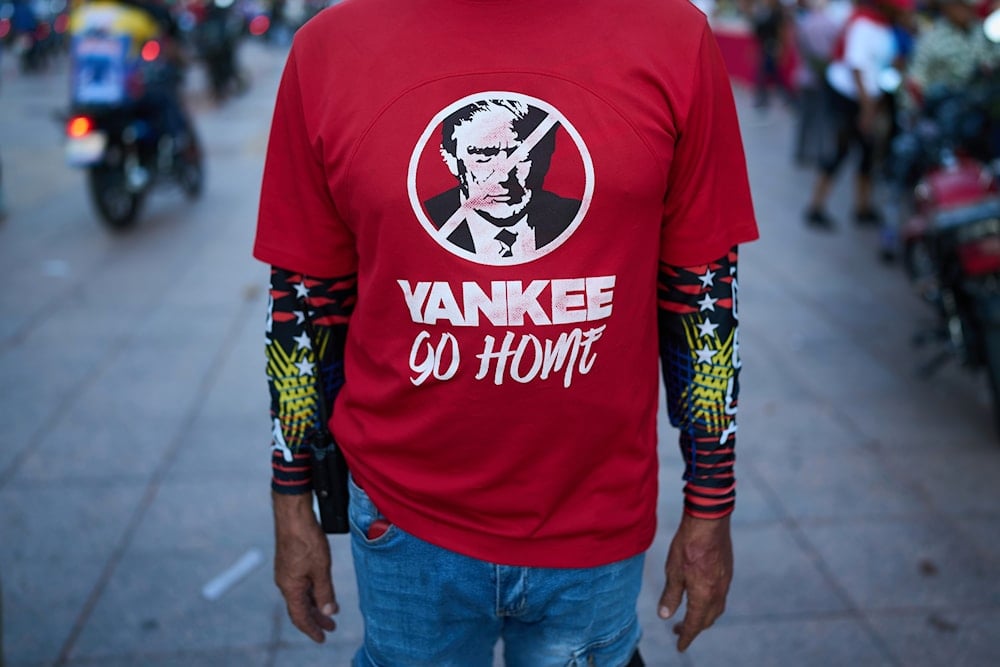Venezuela invasion only expands drug trade, oil, gasoline theft: Petro
Colombian President Gustavo Petro backs Venezuela's anti-drug efforts, warning that any US invasion would boost cartels and destabilize the region.
-

A man wears a shirt with an image of US President Donald Trump during a government-organized rally against foreign interference, in Caracas, Venezuela, Thursday, Oct. 30, 2025 (AP)
Colombian President Gustavo Petro praised Venezuelan security forces for destroying drug-trafficking camps, emphasizing that coordinated action is needed to dismantle mafias rather than merely dispersing them. He highlighted that his proposal to Maduro was aimed at strengthening joint anti-narcotics efforts.
Petro warned that any foreign invasion of Venezuela would worsen drug trafficking and fuel large-scale theft of oil, gasoline, gold, and coltan. He argued that military action would only expand illegal markets and destabilize the region further.
He stressed that a stronger Venezuelan state, achieved through truly free elections, would allow the government to better manage its natural resources and maintain control over its territory. Democratic legitimacy, he said, is key to effective governance.
The Colombian president claimed that the main buyer of cocaine from Catatumbo, near the Colombia-Venezuela border, is a multinational “Drug-Trafficking Board” composed of Albanian, Italian, Uruguayan, and Colombian mafias. He criticized US policymakers, saying misguided anti-narcotics strategies have inadvertently benefited the cartel.
Petro also noted collaboration with European and Arab police, including steps toward an extradition treaty with the UAE, noting that hundreds of tons of drugs have been seized on ships heading to Europe, signaling successes in international anti-trafficking operations.
Lula joins Petro in condemning US actions, standing with Venezuela
Meanwhile, Brazilian President Luiz Inácio Lula da Silva expressed his hope Tuesday that the United States will avoid a ground incursion into Venezuela, reiterating his readiness to mediate between Caracas and Washington to prevent further escalation.
Lula spoke out as US President Donald Trump launched a major military deployment in the Caribbean for anti-drug operations, which have already resulted in dozens of deaths. He stressed that political problems should be solved through dialogue, not military force.
"I don't want us to reach the point of a US ground invasion of Venezuela," Lula told international news agencies, emphasizing that negotiations and diplomacy are the proper paths to address regional tensions.
The Brazilian leader said the issue will be discussed at the upcoming CELAC summit, scheduled for November 9–10 in Santa Marta, Colombia, while expressing hope that the regional forum could play a constructive role in easing tensions and promoting peaceful solutions.
US resumes build-up in the Caribbean, claims it won't attack Venezuela
On November 2, 2025, Venezuelan President Nicolás Maduro condemned the United States for escalating its military presence in the Caribbean, describing the move as part of a covert war aimed at regime change and the theft of Venezuela’s natural resources. He warned that these actions, framed by Washington as counternarcotics operations, were in fact preparations for aggression against Venezuela.
A few days earlier, on October 31, 2025, US Secretary of State Marco Rubio denied that Washington was preparing strikes on Venezuela, even while the US military presence near Venezuelan waters had expanded significantly.
On November 2, 2025, US President Donald Trump dismissed the likelihood of direct military conflict with Venezuela, despite an increasing number of aircraft, naval ships, and troops being deployed to the Caribbean and Eastern Pacific under the guise of counternarcotics operations.
Additionally, on October 27, 2025, Caracas condemned joint drills between the US and Trinidad and Tobago, branding the exercises a “military provocation” and asserting they undermined regional sovereignty amid mounting tensions at the Colombia–Venezuela border.

 4 Min Read
4 Min Read








